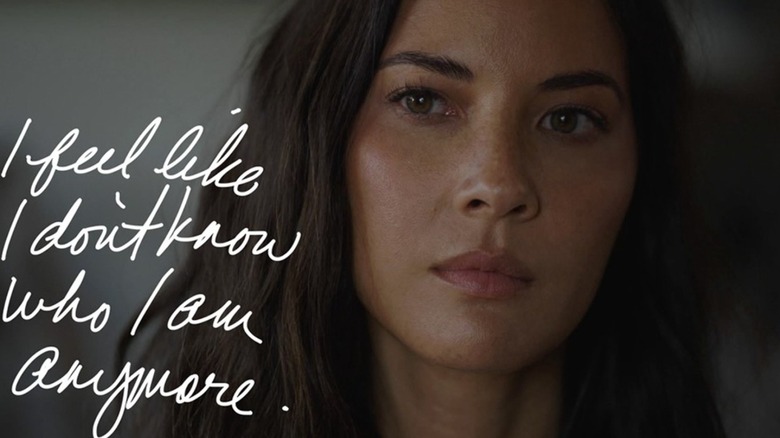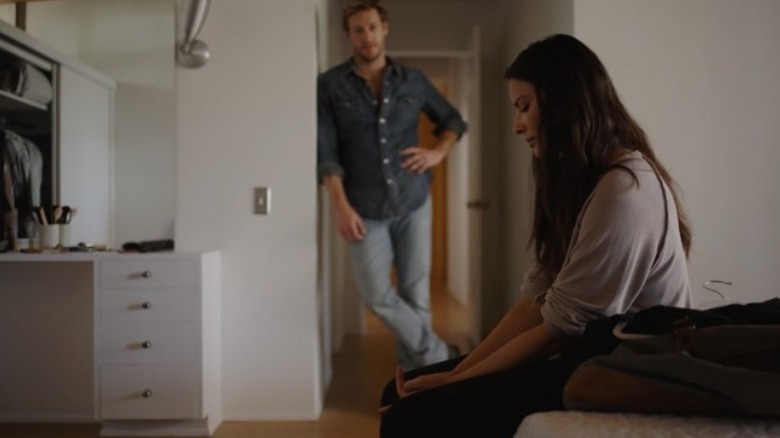Violet Ending Explained: What Did We Learn Today?
We've all had the nagging voice inside our own heads tell us things. For different people, the voice has a different tone and a different intent. In Justine Bateman's "Violet," the titular character (Olivia Munn) suffers because of this voice. Her particular ailments are not disclosed, but its clear that there is a crippling lack of self-worth that leads to pent-up anger and the fracturing of relationships in the film. The battle inside Violet is indicated by both a sinister voice-over from Justin Thoreaux, but also scripted words signifying Violet's conscience that appear as superimpositions on the screen.
Several bouts of anger start to boil within Violet throughout the movie, some for innocuous reasons, others justified. Her best friend starts asking too many questions about her relationships, her boss at the film studio doesn't take her recommendations seriously, and her family condescends her L.A. lifestyle as out of touch and purposefully removed from them. All of these tests feature Violet fighting with the voice inside her head. Bateman dyes the screen in deepening red hues as Violet becomes more and more angry. Finally at the end, she confronts them all.
Having a Breakthrough
Justine Bateman mentioned during the film's debut at SXSW that she considers this movie to be a sort of therapy for viewers. A film version of a self-help book. Not my cup of tea at all and frankly, I consider such type of filmmaking to be a little duplicitous. But if the movie's central aim is to deliberately goad emotional responses and push easy reactive buttons, it's certainly successful in doing so and the end of the film delivers, at least at the surface level, the kind of catharsis or breakthrough that one would feel at the end of a session with their psychiatrist. Perhaps this movie should tell its audience that it isn't a substitute for prescribed medication.
Her final battle is with her brother, who calls her while she's at a Hollywood party and begins scolding and lecturing her about their family ties. Violet confesses her true feelings for their mother and tells her brother never to call her again, signifying a final break between her and her troubled family past. The scripted words on screen indicate encouragement while the voice inside Violet begins to slowly fade to mute.
The End is Different for Everybody
This doesn't mean the voice goes away. Bateman demonstrates in the end that it's not about getting rid of your inner voices, but overcoming the bad ones. Violet starts to smile and smirk more as she begins to realize that the condescending voice inside her is herself telling herself lies. Throughout the movie, she slowly learns to do the opposite of what the voice suggests. She does try to share her true feelings about a guy she likes, she apologizes to her friend for being short-tempered, and she finally confronts her boss in front of her whole department.
The audial and sensorial elements of the film are geared for its viewers to share the experience with the main character and the ending is thus, both aimed as a conclusion for Violet as well as a realization for the people watching her. While the aims are well-intentioned, the movie is rather manipulative in the way that it forces us to achieve the same ends as its narrative. We don't really hold our own path and thus, the ending of "Violet" doesn't ever really feel like anyone's conclusive catharsis other than the central characters, despite the fact that it makes us feel relieved on a purely superficial level. While Bateman does a good job employing the tools of filmmaking to reach her goals, this shouldn't be a Machiavellian endeavor, especially when the point of therapy and mental help is to achieve a breakthrough in your own way at your own pace.


